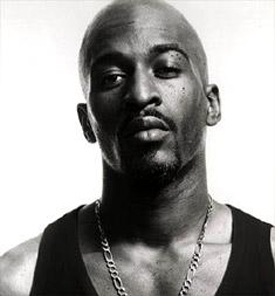
Rakim has earned the right to open his new album, The Seventh Seal, with a track called “How to Emcee.” Over a retro drum pattern, the hip-hop pioneer spits, “I wrote some of the illest rhymes ever put together/ Soon as I make them, rappers take them/ Analyze them for days and paraphrase them.” It’s a capable, sturdy track but features the exact type of boast he has been making since he picked up a mic in 1986 and changed the game.
To a certain degree, Rakim is living and rapping in the past tense, talking up what he used to do and his pervasive influence. Though his claims are based on facts, they still seem dated. His work on The Seventh Seal is akin to a seminal great such as Bill Russell playing in today’s NBA. Rakim is naturally many notches above the average rapper, but he’s playing with an entirely different set of rules and the man whom a slew of emcees imitated now finds himself borrowing their styles.
“Documentary of a Gangsta,” with its cinematic intro, immediately brings to mind Jay-Z’s American Gangster or any number of Kool G Rap songs. Startlingly enough, Rakim goes on to rap “He step his hustle, pimp, smoke, coke, crack, heroin game up/ American gangster/ Sleep with the fish.” Rakim is in good form with his reliable rhymes but not good enough to dodge charges of posturing. There’s a reason the genre of gangster rap invaded the game so quickly and cast him to the margins.
A significant portion of the record also relies on a nearly anonymous R&B washout named Tracey Horton. His pained, Akon-light vocals are featured on “Walk These Streets,” “Man Above” and “Won’t Be Long.” The selection of such an amateur to provide choruses mark yet another instance of Rakim maneuvering awkwardly in the modern game. Horton sings one cliché after the next over a knockoff Just Blaze beat in “Man Above”: “When the world starts kicking me around/ All in my face make me want to put them down/ Trying to earn/ Trying to learn/ Trying to love like a man.”
For his part, Rakim does not fill in the gaps with his verses. He puts on his new favorite persona: the grizzled veteran lecturing the young cats on what’s real. But this quickly sounds just as uninteresting as it seems on paper.
Thankfully, Rakim ceases his lectures and simply allows his intelligence to emerge on “Holy Are You.” Though seemingly incongruous, the topics of black history, science and religion merge quite well in Rakim’s rhymes: “You find your mind too far-fetched for it to fathom/ I bring the darkness to the light, split the atom/ It’s like watching the Big Bang theory emerge/ I take titles, bond them to reveal new words.” The song rewards rewinding and reexamining of the references.
The Seventh Seal is also not without nepotism. Rakim’s daughter, Destiny Griffin, arrives on “Message in the Song,” to make Horton look like Marvin Gaye. Her vocals bring to mind the notoriously, stupendously awful warbling of T-Baby. Eventually, a pattern becomes clear: Rakim is often not the biggest problem with his songs. His lyrics fluctuate between average, good and great. His spirituality and consciousness are also admirable when they’re not blatantly shoved upon the listener.
Ultimately the blame for the mediocrity of the album falls upon his producers, collaborators and whoever else manages what goes on around his words. Working with Dr. Dre can be notoriously demanding, but Rakim should’ve fulfilled his Aftermath record deal if only to avoid making an album so universally cheap and flimsy. There was a time when Rakim used to slam the mic when he was done and make sure it was broken. Perhaps he never should’ve picked it up again.
vmain13@umdbk.com
RATING: 2 stars out of 5



